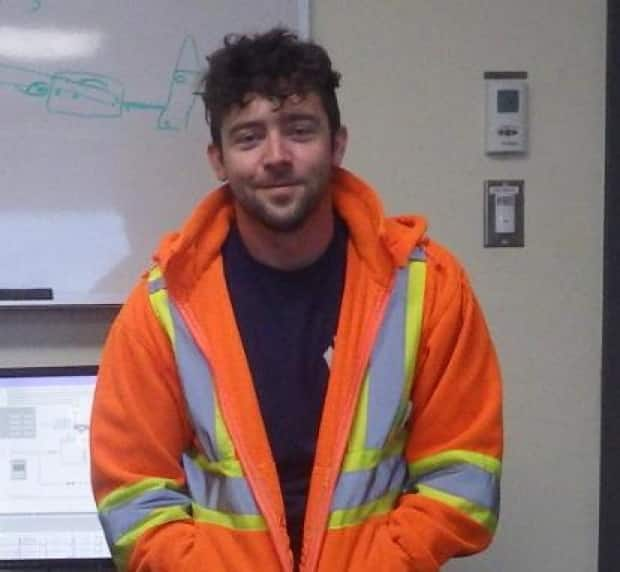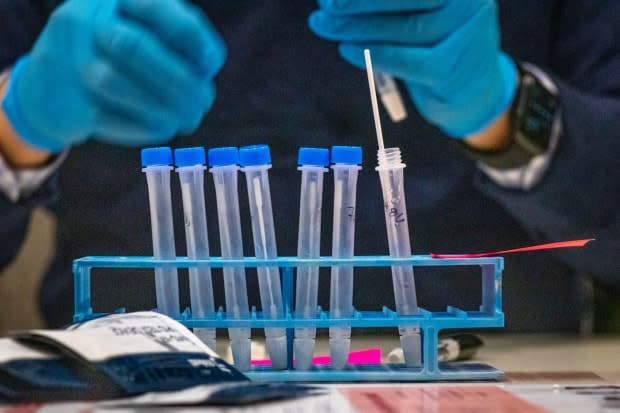N.B. rotational workers await details on changes to travel rules

Gregory Thomas is hopeful about revised restrictions for rotational workers.
But he's still waiting to hear if the province's plan will allow him to see his family without taking his daughter out of school.
The Moncton technician works 14-day rotations at a diamond mine in northern Quebec.
"They obviously know that there was a huge strain put on the out-of-province workers and their families," he said.
Rotational workers have been calling for a reversal of tighter restrictions rolled out on Jan. 30. The current rules require them to self-isolate for a full 14 days away from others.
Before the changes, they could leave isolation early following a negative test, and stay at home with family.
Premier Blaine Higgs said Friday the government is developing a plan to address travel restrictions after hearing concerns.
"I know that the tighter border restrictions have been hard on many people," Higgs said in a statement.
The plan will be developed by Public Health and presented in mid-March to the all-party cabinet committee on COVID-19. No details have been shared publicly.
'Negative stigma'
The new rules have left some rotational workers unable to see their families or forced them to change their work schedules.
When Thomas last returned home, he took his eight-year-old daughter out of school for two weeks so they could isolate together. Her teacher offered to send home assignments and work.
"There's certainly a mental health impact," he said. "I could get through because of the people that I'm surrounded with, but there are many people out there that are going to be in trouble."
Many rotational workers, including Thomas, say the specific rules have singled them out and are adding to "negative stigma" toward those who work outside New Brunswick.

His family strongly considered moving to Nova Scotia, and that remains a possibility.
"This isn't something that is easily forgettable," Thomas said. "It was a harsh decision."
Michael Pelletier goes back and forth between his home in Fredericton and Alberta, where he works two-week rotations as a quality inspector for the gas and oil industry.
Since the changes went into effect, Pelletier has returned home twice.
The first time he spent his isolation alone in the basement of his house. His wife took two weeks off work without pay for the second visit, so they could isolate together.
Pelletier hasn't seen his three children. They are staying with their grandparents for the two weeks so they can continue to attend school.
He said tight rules specifically targeting rotational workers, without providing data or evidence on the risk they pose, is resulting in mistreatment.

A spokesperson for Public Health would not say how many rotational workers have contributed to outbreaks or community spread.
Pelletier said he has heard some spouses of rotational workers have been asked to go home from work.
"Our families feel blamed, we feel blamed, our children that go to school get blamed," he said. "As soon as they hear that their parents are rotational workers they get bullied, they get mistreated."
Calls for expanded testing
New Brunswick rotational workers have been asking for rapid testing to cut down on isolation time when they return home.
The province has only used a small portion of its rapid tests received from the federal government.
Dr. Jennifer Russell, the province's chief medical officer of health, has frequently said the tests are useful for screening but need to be confirmed with a followup PCR test. Those results can take up to two days to receive.
Despite the limited use of rapid tests, Public Health is exploring using them for cross-border travellers.

A Hartland pharmacy is now offering rapid tests for people who cross the border frequently, such as daily commuters and truck drivers. Public Health hopes to expand the pilot project to other locations in the province.
Pelletier said the announcement from the premier felt like "a slap in the face" after the expansion of rapid testing for truck drivers, but not rotational workers.
He wants to see rapid testing at the airport, and work isolation with testing on the fifth and 10th days. That's what the province has in place until late January.
New Brunswick rotational workers are planning to file a lawsuit against the provincial government and have raised more than $23,000 online to cover legal fees.
A spokesperson said the province does not comment on potential legal matters.

